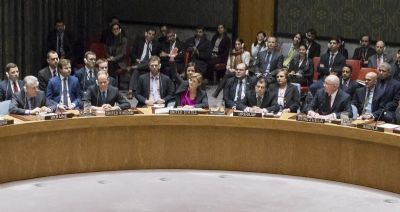"If international law is law in the ordinary sense of the term-and not moral posturing, political maneuvering, or personal payback-then it must comprise settled and public requirements, effective and even-handed implementation, and impartial resolution of disputes. The Obama administration's scandalous decision not to veto U.N. Security Council Resolution 2334 last month suggests that international law at the United Nations is not law in the ordinary sense of the term.
Endorsed by the council's other 14 members, Resolution 2334 condemns Israeli settlement policy as "a flagrant violation under international law" and recognizes all territory east of "the 4 June 1967 lines" (or the Green Line as it is sometimes called) as lawfully belonging to the Palestinians. The sanctimonious but shoddy justifications that leading U.S. officials have offered -- in what appears to have been a well-orchestrated public relations campaign -- reinforce the conclusion that the United Nations and its Obama-administration enablers were bent on punishing Israel and Prime Minister Benjamin Netanyahu. In the process they have accelerated the delegitimization of international law.
Addressing the Security Council to explain America's abstention, Ambassador Samantha Power stated, 'Our vote today is fully in line with the bipartisan history of how American presidents have approached both the issue-and the role of this body.' That's false...
Power is wrong on legal grounds as well as on security and historical ones. The Green Line is the 1949 armistice line to which Israel and Jordan agreed to end the war begun by five Arab armies invading Israel after it declared independence on the expiration of the British Mandate in May 1948. The armistice lines have no inherent legal significance. Indeed, U.N. Security Council Resolutions 242 and 338-the former passed following the 1967 war and the latter enacted after the 1973 Yom Kippur War-both recognized that the 1949 lines were not sacrosanct. Both provided for Israel to relinquish control of some portion, perhaps a large portion, of the land it seized from Jordan (and Syria and Egypt) in 1967 in exchange for security and peace...
The resolution's easily foreseeable consequences are to embolden the Palestinians and their allies in the Boycott, Divestment, and Sanctions movement, encourage them to attack Israel in the International Court of Justice and the International Criminal Court, and to come back to the Security Council as soon as possible while continuing to spurn Netanyahu's repeatedly extended offer to negotiate...
[S]hortly after he takes the oath of office, Donald Trump should invoke Article I, Section 8, Clause 10 of the United States Constitution, which gives Congress power to 'define . . . offenses against the law of nations.' President Trump should ask Congress to pass a law stating that the U.N. resolution is such an offense and shall not be recognized by any U.S. entity as authoritative. The law should impose sanctions against any U.S. person or entity that cooperates in the enforcement of the resolution..."
January 8, 2017
Obama and the UN Security Council: Weaponized International Law

U.S. Ambassador to the UN Samantha Power abstaining from the vote on UN Security Council Resolution 2334, December 23, 2016
Date
January 8, 2017
Title
Weaponized International Law, Real Clear Politics
Author(s)
Peter Berkowitz
Original Source
